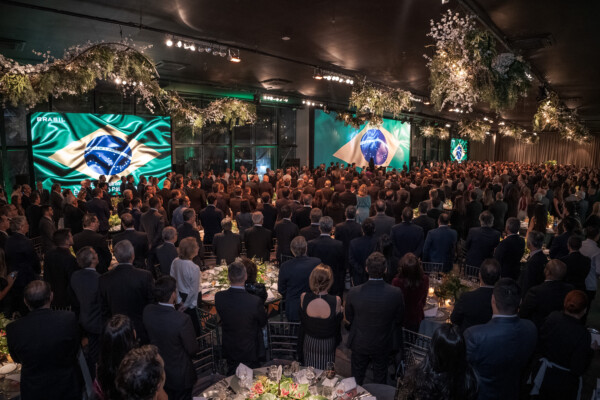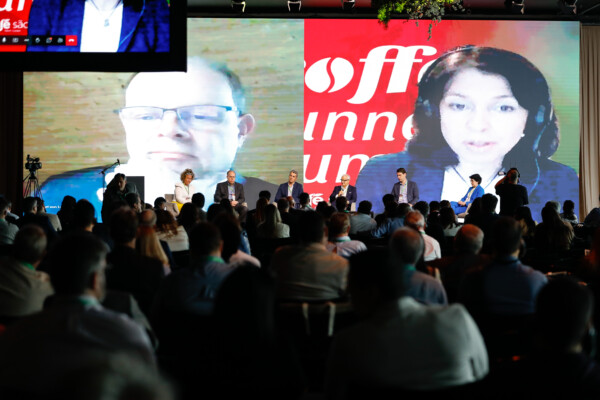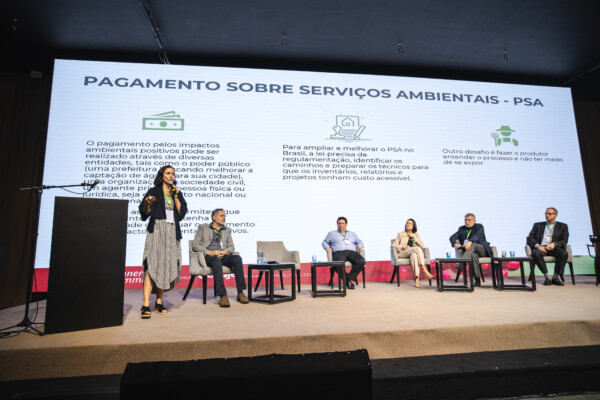Innovative actions from the export segment expand Brazil’s competitive advantage in the access to strategic markets
On May 25 and 26, 2023, the Brazilian Coffee Exporters Council (Cecafé) hosted the 9th Coffee Dinner & Summit, an event that brought together more than a thousand people and leaders from all coffee segments in Brazil and the world for two days, promoting business and discussions under the theme “Production Growth: Challenges and Opportunities In Times of ESG”.
In line with trends in the consumer market, which increasingly values transparency on ESG compliance throughout the coffee value chain, the event fostered discussions on the impact of new global regulations and climate change on the coffee sector, among other topics.

Several actions developed by the Brazilian coffee export segment to strengthen environmental, social and governance issues were presented, highlighting the resilience of the Brazilian coffee growing industry and its ability to adapt to global challenges.
The “Global Coffee Associations” panel brought together leaders from the international coffee sector and Hannelore Beerlandt, Advisor to the European Commission on Commodities, to discuss the challenges of increasing traceability in the face of emerging regulations in the European Union and under discussion in the United States, the main destination markets for Brazilian coffee.
Reflecting the longstanding work of the Brazilian export segment to strengthen environmental, social and governance issues, Cecafé and its members launched a partnership with Serasa Experian for a platform to track the ESG parameters of the Brazilian coffee chain.
The tool will allow a risk management adapted to different sustainability protocols and support for suppliers, both in terms of access to credit, with differentiated conditions, and in terms of social and environmental regulation, if necessary.
This initiative aims to strengthen Brazil’s reputation as a reliable supplier of sustainable and quality coffee, because, as Hannelore Beerlandt pointed out, the countries best prepared to comply with the new regulations will have a competitive advantage in accessing the European market.
Focusing on the environmental pillar of ESG, the panel “Negative Carbon Sustainable Coffee Growing in the Face of Global Corporate Goals: Brazil closer to the carbon market” addressed the challenges faced by the global industry in its journey to neutralize greenhouse gas (GHG) emissions, the resilience of Brazilian coffees and the actions developed by the export segment to mitigate the effects of climate change.

Exploring opportunities in green finance were also discussed, including payments for environmental services, such as the CPR Verde, and the global carbon market, which has the potential to reach EUR 1 trillion by 2025.
These are important economic tools to reward Brazilian coffee growers for their long-standing efforts to conserve natural resources (water, forests, biodiversity, and carbon sequestration).
The existing partnership between Cecafé and StoneX was presented, which aims to evaluate the pre-feasibility of a cluster program to generate carbon credits in the coffee sector in Brazil.
With the direct participation of exporters, this project aims to monetize the results of the first phase of the Carbon Project developed by Cecafé in partnership with Imaflora and Prof. Carlos Eduardo Cerri (Esalq/USP), which demonstrated an additionality of 10.5 t CO2 eq per hectare of coffee per year through the adoption of good agricultural practices.
The Cecafé/StoneX Cluster Program will evaluate existing methodologies and project registration processes and aims to contribute to the development of a “Cafés do Brasil” carbon credit platform.
The Coffee Dinner & Summit also recognized the social importance of coffee growing in Brazil, where there is a positive correlation between the Municipal Human Development Index (HDI-M) of communities and the coffee growing areas in farming regions. In other words, the greater the area dedicated to coffee growing in the municipalities of the main producing states, the greater the life expectancy, income, and education of the population.
To further promote human development, knowledge, and advances in the competitiveness of the sector, Cecafé launched the Remote Learning Platform for the Informed Farmer Program in partnership with the Global Coffee Platform (GCP) and Microsoft.

By offering free courses in sustainability and information technology, this project will increase the alignment between growing regions and the demands of the consumer market to meet the growing demand for socially and environmentally responsible products.
In addition, farmers and workers will become more efficient with digital tools, which will have a positive impact on the management of rural properties.
The Coffee Dinner & Summit expressed the vision of an integrated and efficient production chain that unites efforts, seeks solutions, and adopts innovations to promote the continuous improvement of socio-environmental governance.
In this sense, Brazilian coffees stand out in terms of human development, conservation of natural resources and the adoption of good agricultural practices – which result in a negative carbon footprint on farms – and transparency in meeting ESG criteria.
Marcos Matos
CECAFÉ CEO
Silvia Pizzol
CECAFÉ Sustainability Manager


Leave A Comment